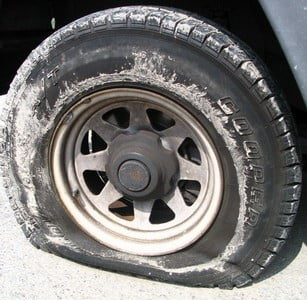More than any other component on your car, tyres are meant to be regularly replaced. They’re in contact with the road the entirety of their lifespans, and they’re expected to bear and absorb the weight of the entire vehicle. They can suffer a small puncture that will cause them to gradually deflate over time. They’re also prone to occasionally suffering a catastrophic blowout. This usually happens when there’s some obstacle in the road that carves a larger hole in the tyre.
In many cases, there might be very little we can do to avoid suffering from a flat tyre – whether it’s one that arrives suddenly or one that arrives quickly. There are, however, a few preventative steps worth taking. Let’s run through them.
Check your Tyre Pressure
Consistently over or under-inflated tyres are more vulnerable than correctly-inflated tyres. If the tyre is overinflated, it will bulge in the centre, putting all the car’s weight in a small part of the wheel. If it’s underinflated, then the same problem will happen in reverse, with the weight being diverted to the edges of the tyre. Properly inflated tyres will contact the road evenly, and therefore last longer before suffering a puncture.
Change your Tyres
Regularly changing your tyres will help you to avoid a blowout. This is necessary even if you aren’t putting in all that many miles, since the rubber on your tyres will naturally degrade even as it’s just sitting on your drive. You can buy tyres online and fit them yourself, or you can pay someone to do it for you.
Avoid Obvious Hazards
While it might be tempting to simply run over any obstacles in your path, doing so will shorten the lifespan of your tyres – even if it appears that the obstacle isn’t all that significant. This might include bits of litter, pot-holes (which are common on UK roads), and puddles.
Avoid Overloading
The more weight they’re carrying, the shorter the lifespan of your tyres. Some tyres are designed to cope with heavy loads. They’re usually found on larger vehicles like 4x4s and vans. Others are not quite so robust. If you overload your tyres beyond their rated maximum, then you’ll increase your chance of suffering a puncture.
Lower your Speed
Frequent heavy braking will shorten the lifespan of your tyres. This is a good reason to keep your speed down; the slower you’re travelling, the less strain on your brakes. This will also help you to avoid any sudden obstacles.
Check your Brakes
For much the same reason, it’s also a good reason to regularly test your brakes. Brakes that work effectively will not only keep you safer, but limit the strain on your tyres. In the long run, it’s worth the extra expenditure, since it will save you having to shop for replacements quite as regularly.





